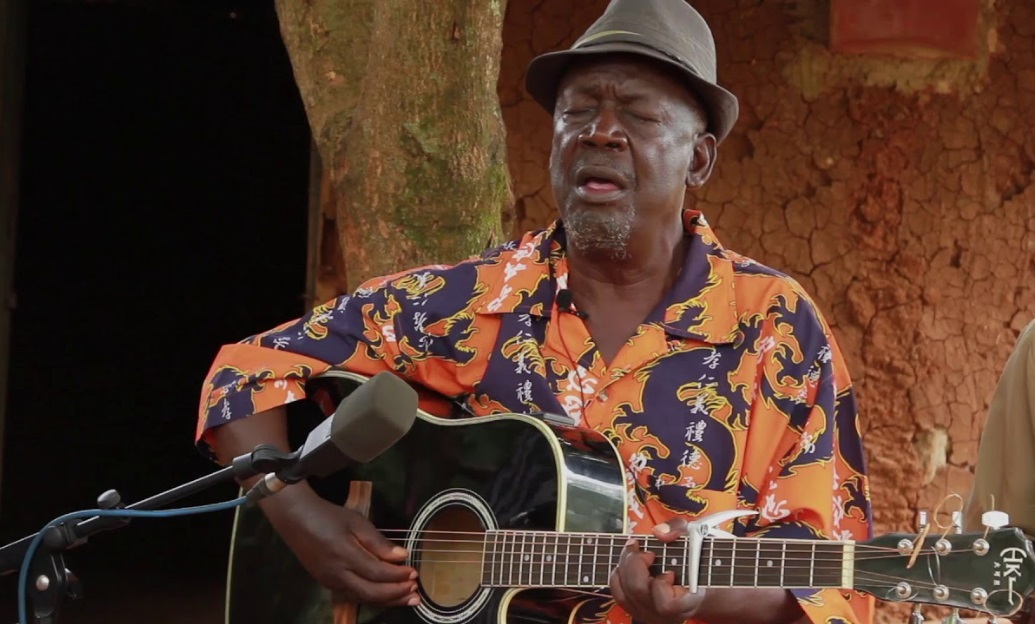Fanuel Amimo. PHOTO | COURTESY
One of the unsung heroes of music from western Kenya also happens to have been a one-hit wonder, with that song earning him a place among the greatest composers of the Luhya omutibo genre several decades ago.
The name Fanuel Amimo may not ring a bell to the younger generation of music lovers, but Rosa Nokhwebwe is a song that many danced to and enjoyed singing along when it was released in the 1970s. Sadly, Fanuel did not make any money from that hit and was in the 1980s employed as a casual worker at a printing press in Nairobi’s Industrial Area.
The late editor and music buff, Amboka Andere, extended a hand to Fanuel, when he was struggling to cater for his family by getting him hired at the printing press of the now defunct Kenya Times newspaper.
The Rosa Nokhwebwe composer and lead vocalist was one of the prominent Luhya musicians in the 1960s and 1970s, with his Butere Jazz Band. His song was about Rosa’s bride price and wedding!
Fanuel played second fiddle to such music giants as George Mukabi of the Mtoto Si Nguo hit song fame. Incidentally, George, who was a waiter on the train those days, did music part-time and never composed even a single song in Luhya.
Other Luhya music greats included Peter Akwabi, Daudi Kabaka and John Nzenze.
The greatest of them all was most probably Kabaka, who had many hits, such as Shauri Moyo Nyumba ya Tumbaku, and Msichana wa Elimu. He was said to have been jilted by a young woman, who later went abroad to study and on her return became a teacher, rising to headmistress of one of the leading girls’ secondary schools in western Kenya.
Daniel Amunga was also a music producer and guided Fanuel and others. He recorded the song, Someni Vijana, urging young people to work hard in school. It was very popular. Amunga later released America to Africa, encouraging Kenyans who had gone to study overseas to return home and build their country.
The musician excited trade unionist and later Cabinet minister Tom Mboya, who was instrumental in the airlifts that took Kenyans to the United States to study on scholarships by philanthropists. They included famous American singer Harry Belafonte.
Also among the top Luhya musicians was John Nzenze of the Twist ni Nzuri and Angelike Twist hit songs fame and George Agade, who collaborated on the 1966 smash hit, Helule Helule, with Daudi Kabaka.
Born in 1947 in Shianda Location of Butere in today’s Kakamega County, Fanuel Amimo recorded his first single in 1964 with David Amunga as his producer at Andre Crawford Studios in Nairobi. His other songs were Harusi ya Leah and Safari ya Magadi.
Though in poor health, Fanuel continues to strum the omutibo guitar lines in his twilight years, remembering the past glory of music from western Kenya.
The world of music has had many other one-hit wonders. One of the most controversial was the hit song, Girl You Know It’s True, by then Germany-based duo of Milli Vanilli.
Their scandal unravelled in 1989 when Fabrice Morvan and Rob Pilatus were outed for having masqueraded as the vocalists, which the real singers were John Davis, Charles Shaw, and Brad Howell.
A Grammy Award the two rhythm and blues fakes, who were actually models, had won was revoked, as the lip-syncing scandal rocked the music world.
Fabrice and Rob were exposed during an MTV concert in Connecticut in July 1989. As they took the stage, the track jammed and repeatedly played one part of the song and they had to rush offstage.
Congolese musician Mose Fan Fan, who died recently while visiting Nairobi from his base in England, is famous for the hit song, Papa Lolo. This is the song that drove him to great fame after being found by chance on the internet and circulated. It went viral, and was played widely in Congo, other parts of Africa and Europe.
Fan Fan would later reveal that the song became famous nearly 12 years after he released it. Just before he died, he was seeking to work with fellow musicians in Kenya and Tanzania.
However, older lovers of Lingala music know Fan Fan from the mid-1960s, when he was a member of the grand master, Franco Luambo Luanzo’s band, OK Jazz. Recognised as a guitar wizard who rivaled the master on playing the lead guitar and always filled in for him at concerts, he composed one song that would later become a mega hit. It is the highly danceable, Dje Melasi, which introduced the guitarist to adoring fans of OK Jazz.
He also had a stint with Marquis du Zaire, the famous Dar es Salaam-based Congolese band of the 1980s. He would later shift his base to Nairobi before he went in search of greener pastures in Europe. But unlike other Congolese musicians, who prefer France and Belgium, for the convenience afforded by their knowledge of French, Mose Fan Fan went to England and became naturalised. After he died in Nairobi, his body was not ferried to Kinshasa. It was instead flown to England for burial.
In Papa Lolo, Mose Fan Fan is nostalgic about returning to DRC after years of living abroad and trying to trace his family members. Papa Lolo babwaki yo wapi? (Papa Lolo, where did they throw you?).
Guinean musician Mory Kante made a name for himself in Africa and beyond, thanks to his danceable anthem titled, Yeke Yeke. That is the only song by him that many fans know or remember.
Kikuyu musician John Ndichu etched his name in the annals of the history of Kenyan music with his song, Cucu wa Gakunga. It was a famous dance hall tune that transcended regions and languages. Many danced and sang along, even if they did not understand what he was singing about this grandmother of Gakunga.




